Publication date: 06.10.2023
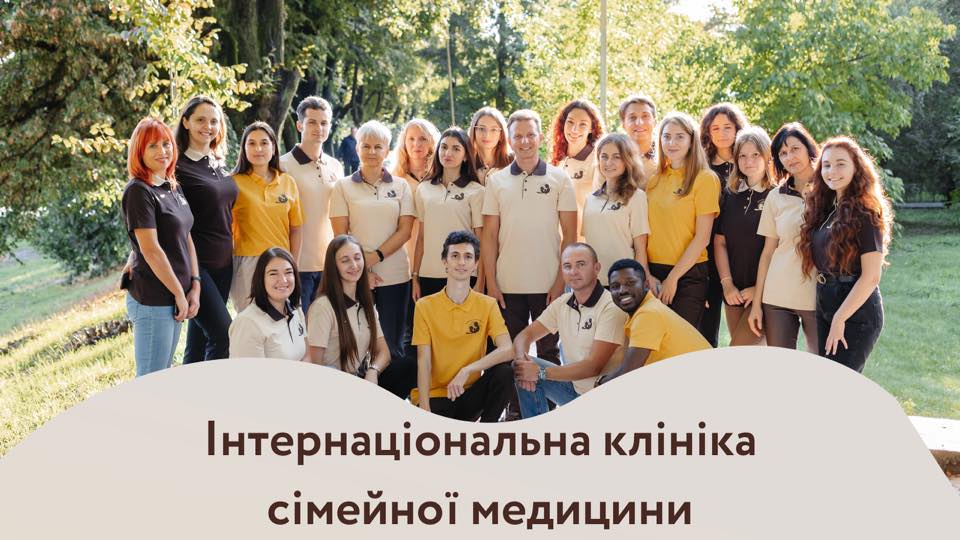
Pavlo Kolesnyk is a family doctor who has been practicing since the time when people in Ukraine knew about this concept only from American movies, and has been teaching family medicine for 25 years. Young people also gather around their senior medical colleagues: family doctors, senior students and interns. It took us some time to establish the process of work, when we realized that people under stress (especially when it is so severe!) often act instinctively and try to collect as many medicines as possible.
“With the opening of the new international family medicine clinic, which will also serve as a practical medical training center, we can hope that we are taking a step towards a victorious peaceful future right now ,” the doctor says.
To unite young talented doctors, to build a model of a real family medicine clinic on the basis of a small volunteer center and not to refuse to help anyone: neither local patients nor those who found themselves in Uzhhorod because of the full-scale invasion. And also to motivate others to act.
He is a family doctor who has been practicing since the time when people in Ukraine knew about this concept only from American movies, and has been teaching family medicine for 25 years. We are talking about Pavlo Kolesnyk, PhD, Head of the Department of Family Medicine and Outpatient Care at the Medical Faculty #2 of UzhNU (where foreign students study – author’s note), who became the first Ukrainian family doctor to receive a 5-star award from the European organization WONCA Europe. On his initiative, the Educational and Scientific Training Center for Family Medicine and Premedical Care was established at the university and is still successfully operating (Pavlo Kolesnyk is its director).
But the war changed everything, shifting the emphasis somewhat, but forcing us to unite and help people. We meet with Pavlo Olehovych after his classes at the university, seeing patients, providing consultations, and holding a ZOOM meeting with family medicine practitioners from all over Ukraine. And after a short conversation about his father (Kolesnyk’s mother and father are English teachers), who helps him prepare documents for a new grant so that he can not only help people but also pass on his knowledge to young professionals.
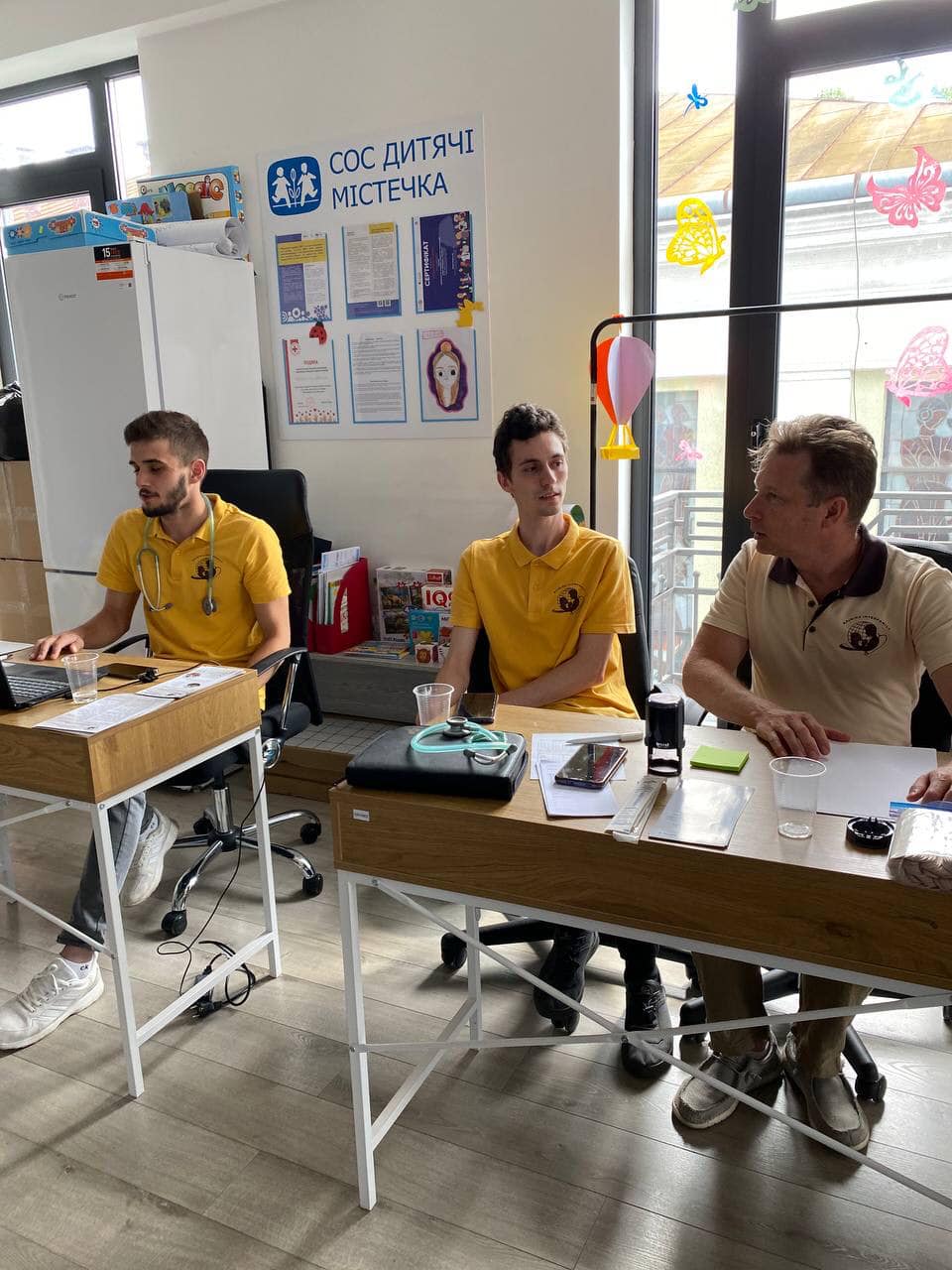
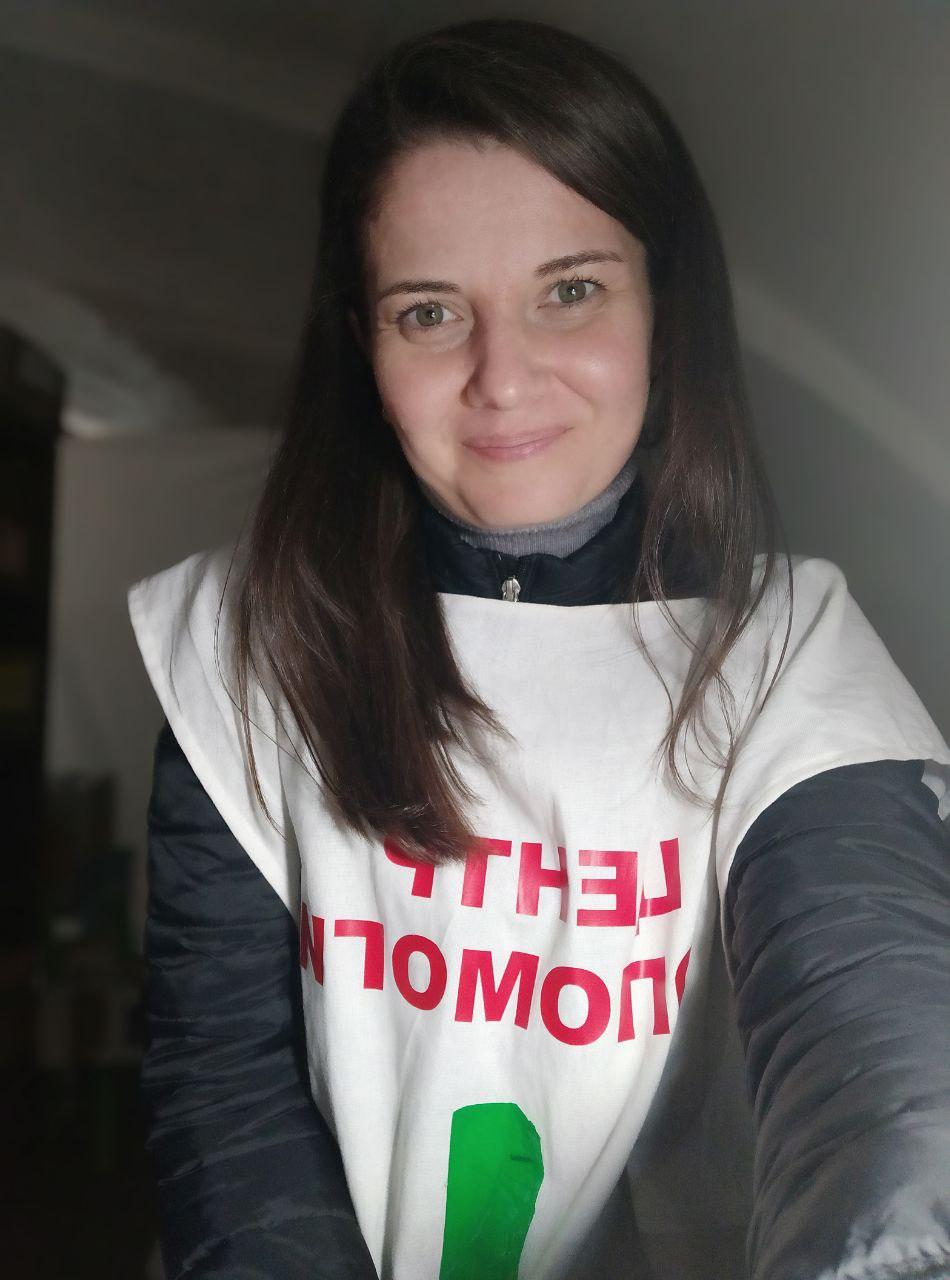
“The war unleashed by Russia has become a challenge for every citizen of our country, and Ukrainian doctors are no exception : for many, this is the most difficult period in their lives. The first days and weeks of the war were a real nightmare for Uzhhorod doctors, who met thousands of frightened, confused people from eastern and southern Ukraine who had no access to medicine, food, or clothing. The doctors had little idea how to help all these people in such conditions and how to act in such a troubled time. Some of the displaced managed to settle in the private sector (almost every second or third family in Uzhhorod took in those who were forced to flee the horrors of war), and a significant number of displaced found shelter in student dormitories, schools, gyms, and spontaneously organized hostels. From the first days of the war, my wife (also a family doctor) and I came to the IDP Assistance Center in the historic Owl’s Nest complex. We brought not only clothes and food from home, but also stayed there to volunteer: unloading, sorting… And you know, we noticed a lot of medicines in the Center: both from the townspeople and humanitarian aid from foreign partners. And that’s how it all started” Pavlo Olehovych recalls, putting down his laptop and showing the first photos from the chaos of the Owl’s Nest.
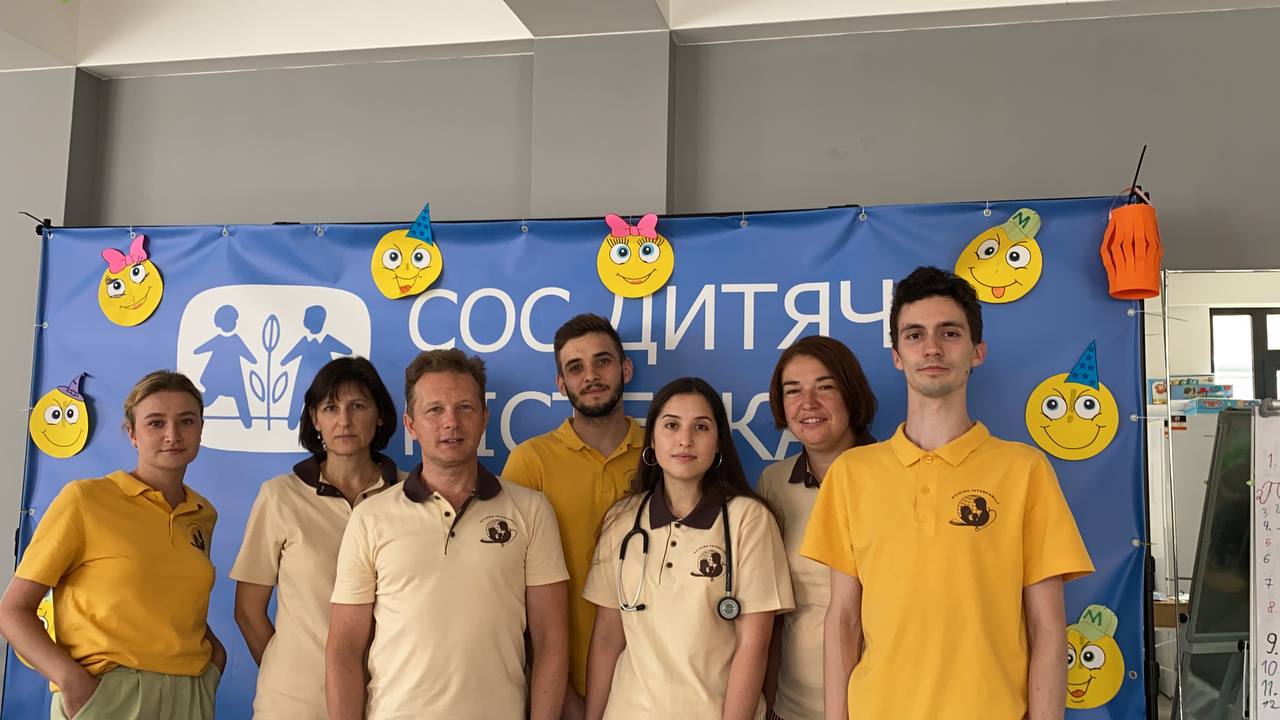
“I invited my departments to help sort all the medicines. It took us several weeks to do this. We had a clear understanding: this is for the front, this is for children, this is for dormitories, etc. Then we made some kind of first aid kits with the most necessary things. At Sovyne, we started registering IDPs arriving in Uzhhorod, people were stressed, the rooms were small, and people often got sick. So we were torn away from the sorting and provided first aid: blood pressure, temperature, initial examination. So in our small corner, we got a table and a few chairs – we set up a medical center. Here we examined people and gave them the necessary medicines,” recalls Paul.
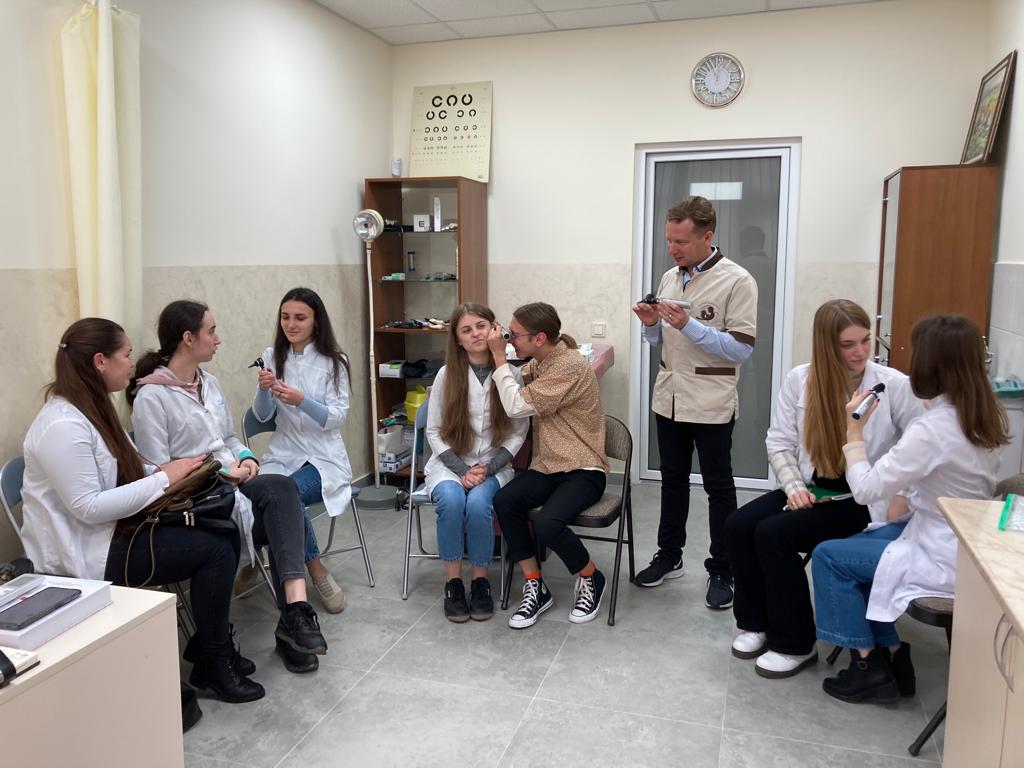
Young people also gather around their senior medical colleagues: family doctors, senior students and interns. It took us some time to establish the process of work, when we realized that people under stress (especially when it is so severe!) often act instinctively and try to collect as many medicines as possible.
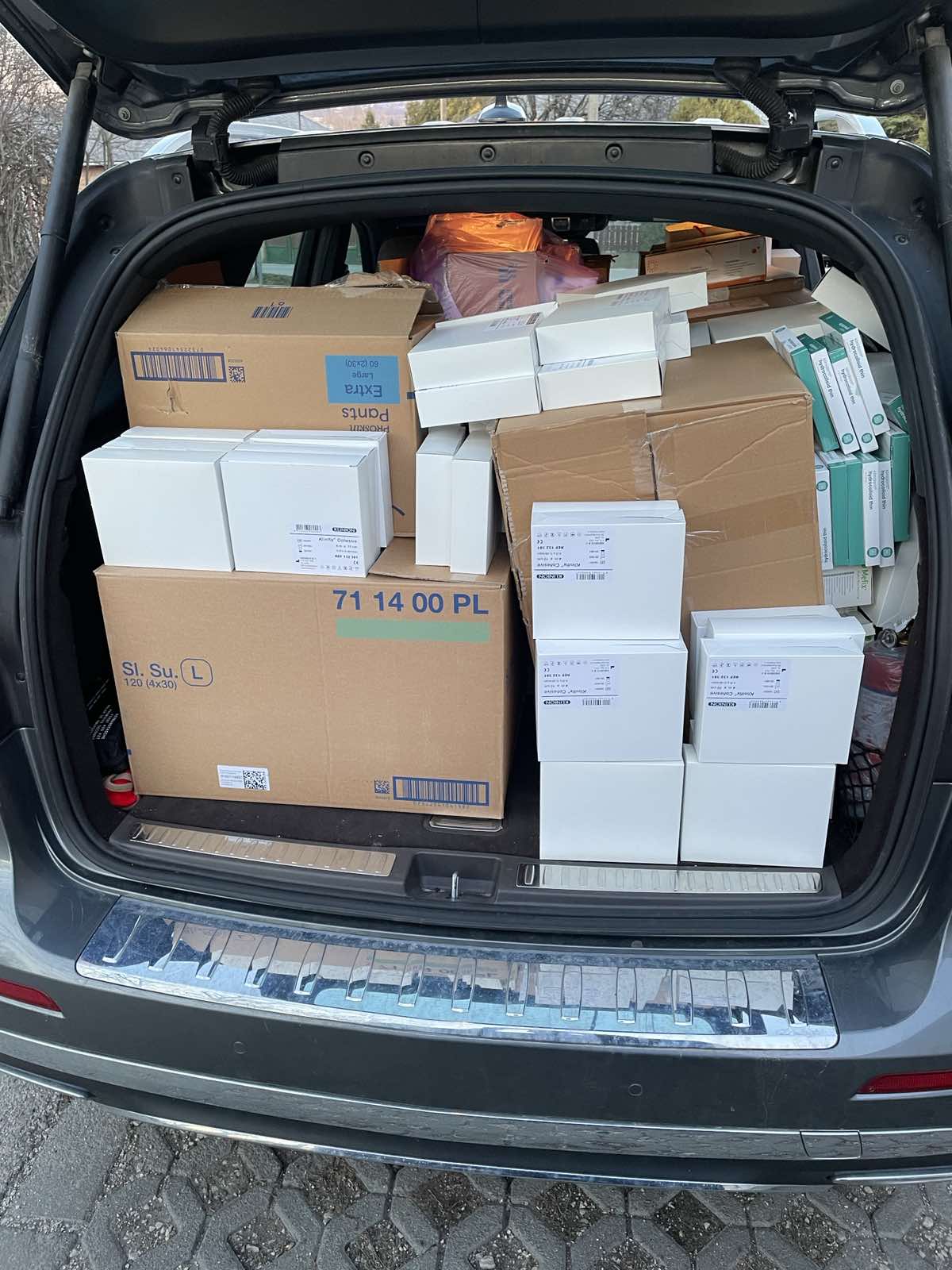
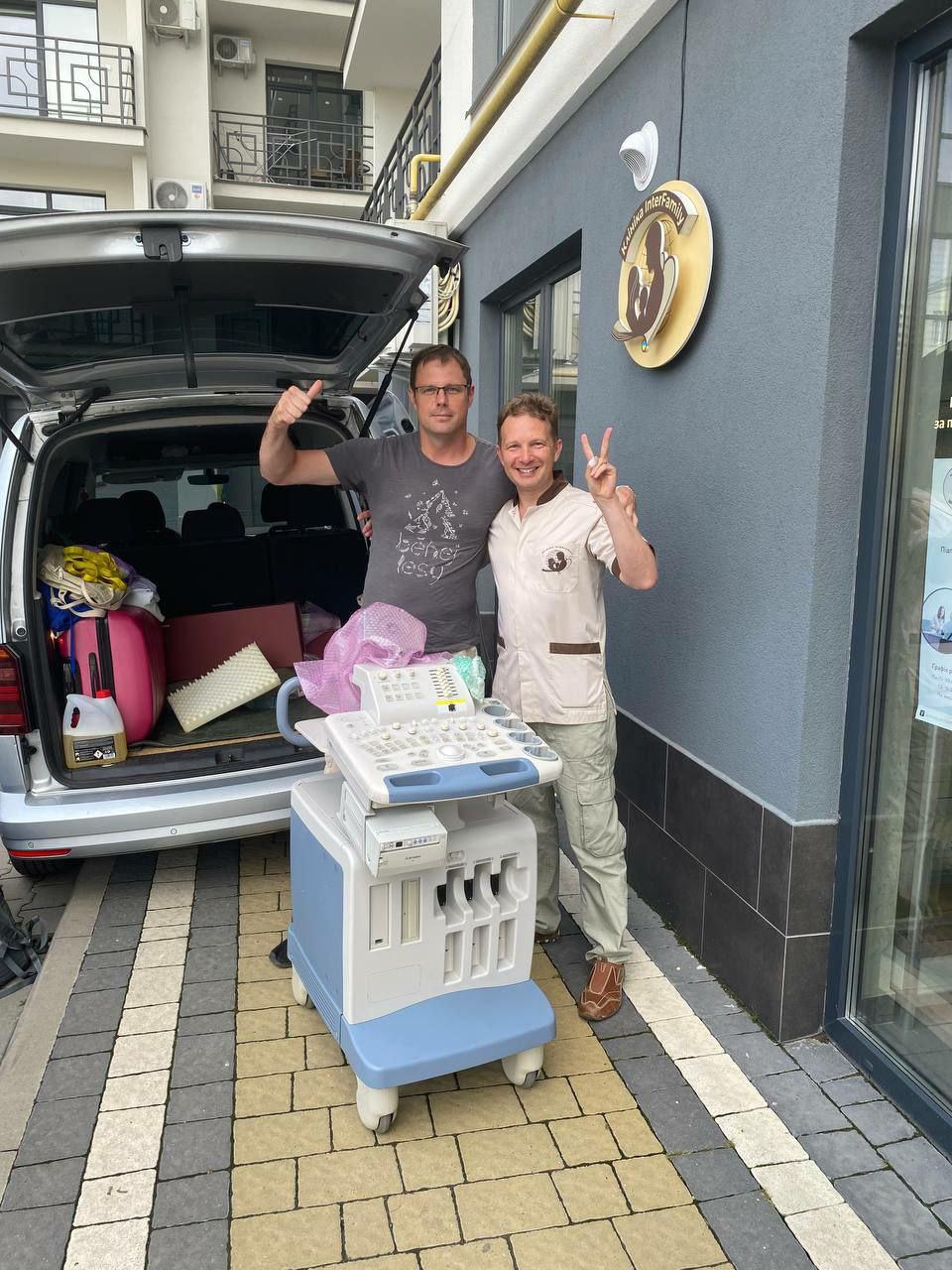
“We agreed: the process of distributing medicines is not appropriate without medical counseling for the patient, it is necessary to provide people with electronic prescriptions and referrals, to coordinate their medical route in a new unfamiliar city. In order to avoid distributing medicines indiscriminately and “in reserve”, we had to move the volunteer medical center for free consultations, distribution of free medicines and issuing electronic prescriptions and referrals to a new location near the Owl’s Nest.” It was in a small inhalation room of the rehabilitation center of the children’s hospital. We left one coordinator in Sovyne to direct people to our makeshift medical center for IDPs. We wanted to help people effectively“, Pavlo Olehovych stops and recalls that IT volunteers came to the rescue: they developed a special program and the doctors here have an online record. After all, the flow of people in small Uzhhorod was remarkable.
“To streamline things, we developed a system of pre-registering patients for doctor’s appointments: a high school student from Irpin took over this work. The young man made the appointment himself, registering patients by phone using a special registration form. The electronic accounting program developed by the volunteers of the medical center included data on IDP patients, the reasons for their visit, diagnoses and recommendations. Everything was coded according to the international classification ISRS-2, created for family doctors, which has recently been introduced in Ukraine, as well as in dozens of other countries. The current needs of patients were analyzed on a monthly basis and the most popular medicines were recorded. We helped (and are helping) people not only in Uzhhorod, but also those who remained in the “dangerous” regions, sending them the necessary medicine. I wrote a letter to my friends in Europe and the United States saying that we are sorely lacking certain types of medicines (in particular, doses of Euthyrox/Levothyroxine; insulin; certain vaccines, etc.) People abroad responded eagerly and we received such regular medical assistance from our partners. How we organized the so-called deliveries is another story.”Pavlo smiles and pauses.
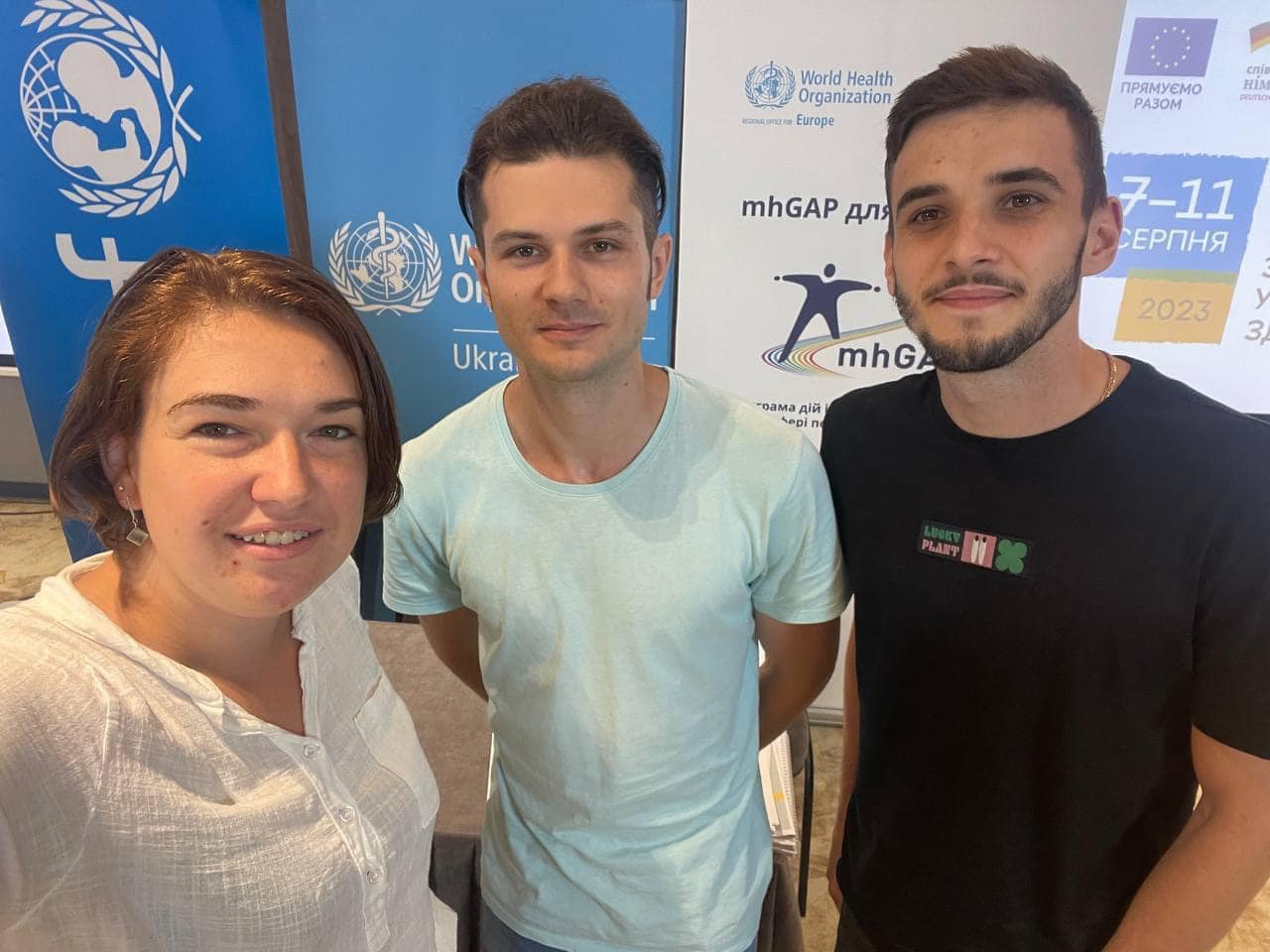
“You know, people often ask me: “Who do you consider yourself to be: a doctor, a manager, or a teacher?” And I boldly say: a teacher. This is my life. I had a lot of experience volunteering before the great war: we implemented projects, both educational and medical. And with European partners, Médecins Sans Frontières, friends from Uzhhorod’s sister city, Corvalis. There were a lot of things. It is a mission to share our experience with young people. You know, we’ve had a lot of challenges in recent years: starting with Covid, and now the war… But I always believe in young people. But the war has given us very difficult challenges. For example, the interns were assigned to Uzhhorod’s shelters. There they began to play the role of primary contact physician with internally displaced persons who lived in gyms, dormitories, and former offices…. Activist doctors, including young colleagues without practical medical experience, were on round-the-clock duty at checkpoints on the border and at train stations, where numerous waves of displaced people arrived daily and needed various types of assistance. Medical experience was gained, so to speak, in the field.”.
And at this point, there is another pause. As it turned out, it was to introduce another initiative: lalibai.
“Every evening we had online meetings, which we called ‘evening tales’. They were conducted by experienced teachers of the Department of Family Medicine and Outpatient Care of the Medical Faculty of UzhNU in the format of mini-lectures. We chose relevant medical topics with further analysis of current issues (what they saw “in the field”). This initiative was further supported by the European Academy of Family Medicine Teachers EURACT. This is how the EUSIT project (“EURACT Assistance to Medical Education of Ukrainian Doctors during the War”) was developed, in which experienced family doctors from Europe continue to record online lectures relevant to today in the format of clinical case descriptions, after which these lectures are translated into Ukrainian. Soon, it is planned to create open access to these lectures for the audience of family doctors from all over Ukraine. In addition, weekly trainings with the participation of foreign experts and Médecins Sans Frontières have replaced the “evening tales” and teach practical skills to volunteer doctors.”.
This is how the volunteer family medicine clinic was born. Volunteer doctors, young specialists and senior colleagues changed three rooms. That’s when another idea came up.
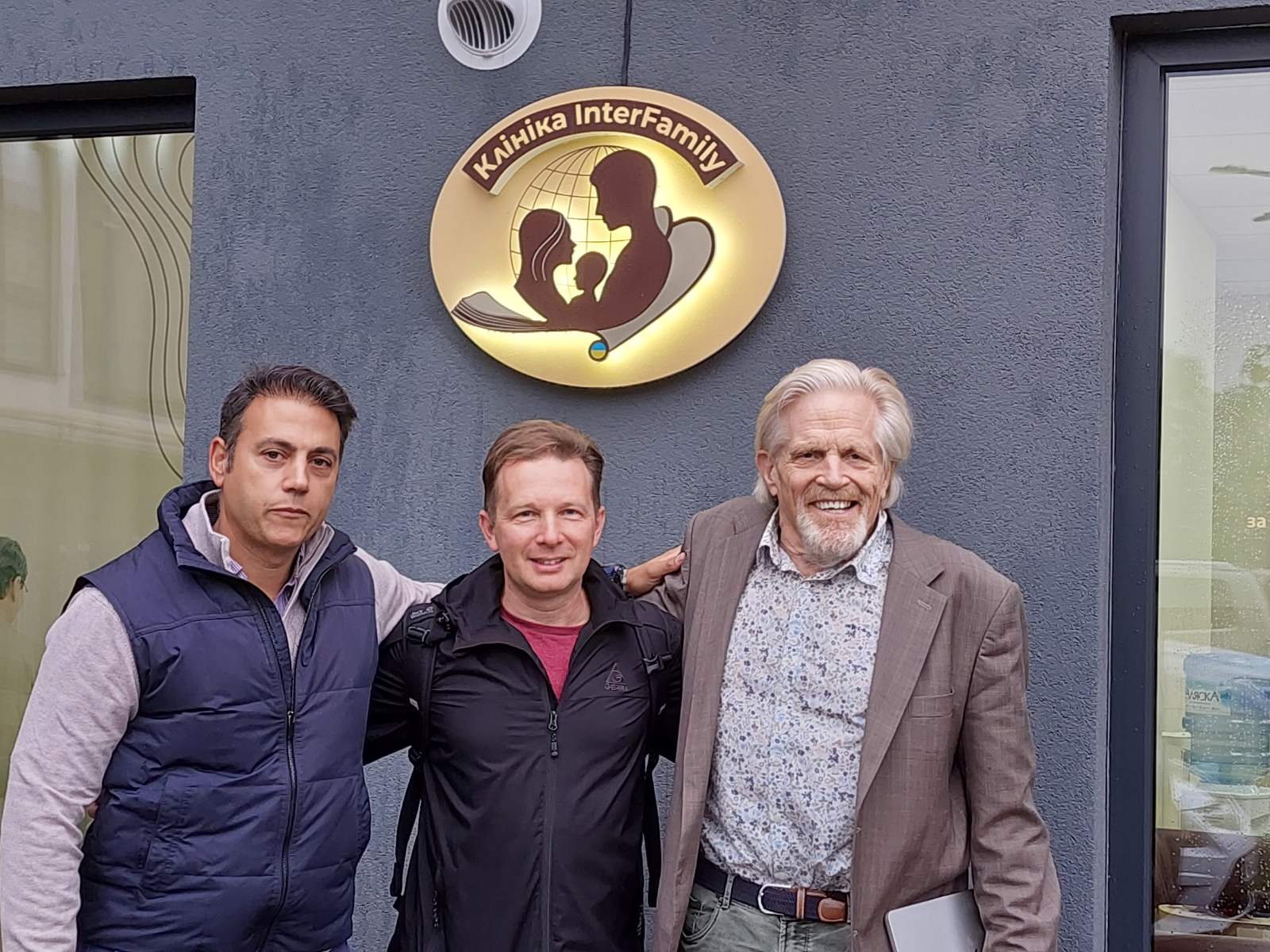
“Given the growing demand of IDPs for primary health care, limited opportunities for internships and independent practice of young doctors in family medicine institutions, and the increasing number of offers from foreign medical colleagues, including the organization “Médecins Sans Frontières (Doctors Without Borders) for joint work, there was a need to create a volunteer family medical consultation center (International Family Medicine Clinic) that could become a prototype of a practical family medicine educational institution. To this end, we wrote and prepared a project to create such a medical center and received a grant from organizations around the world: WONCA, EURACT, Corvallis-Uzhhorod Sister City Association, The Church of Jesus Christ of Latter-day Saints, and personal contributions from foreign family physicians. We received a comfortable room, consulted with the best foreign experts on planning, renovated it in three months, and started our practice. On September 20, our clinic turned one year old.”Pavlo Olehovych continues his story with a smile.
“Until this summer, after five months of negotiations last year, we had a contract with Médecins Sans Frontières, who took us under their patronage. We provided free medical consultations, laboratory services, etc. I also like to tell the story of how a young volunteer, Sasha Chickering, who had just graduated from high school, came to us by bike from Spain across Europe. He was purposefully raising funds for medical care for Ukrainians. His father Wil is also a family medicine doctor. They literally helped us survive last winter when it was very cold and there was no electricity. Therefore, the funds they raised were used to purchase a modern energy storage device so that we could keep the premises warm. We also needed to somehow preserve vaccines and medicines. Then Wil Chickering helped us find a volunteer from Spain, who brings us a refrigerator for vaccines and a unique device for non-contact monitoring of intraocular pressure . And then there is our friend, American Dr. Mark Rampton, who has been with Ukraine for decades and whose contribution to the clinic’s establishment is hard to overestimate. Now we have 27 people on staff. This is a lot of family doctors with whom not only IDPs but also citizens sign declarations. And the declared ones receive free consultations as part of the NHSU packages. But we don’t refuse anyone, because we are committed to helping people.”.
I’m about to turn off the recorder and just have tea with the doctor, but I’d like to mention another important aspect of my work: teaching. Despite all the challenges, students are eager to learn medicine. And in the second year of Russia’s full-scale invasion of Ukraine, foreign students returned to Uzhhorod. There are also many interns, who often want not only to do an internship, but also to experience the real backstage of clinics.
“When we first opened, we didn’t know if we could withstand the competition. But we knew the mission. From the first days of volunteering during the war, we were surrounded by young promising doctors. I trust them a lot. For example, today My deputy is Yuriy Sich. He is a second-year intern and already a great manager, with a lot of support on his shoulders. I had never had such an experience. My students are almost always with me at receptions. Of course, I ask the patient for permission in advance. But they have never refused. On the contrary, one of my old patients once said to me: “It’s so interesting how you share your experience with young people, perhaps I see the beginnings of a future outstanding young doctor.” In addition, clinics or hospitals are often not very willing to accept foreign students. They are welcome here. They are practicing techniques, learning by doing. We already have a great example of our colleague, let’s call him Nana, he is from Ghana. І He stayed in Ukraine, saw patients for a year, and taught at the department. I asked him: “Why is that?” And he boldly answered: “I have lived in Ukraine for one third of my life, studying at the university, and I believe that when the country is in trouble, it is my duty to be here with it.”.
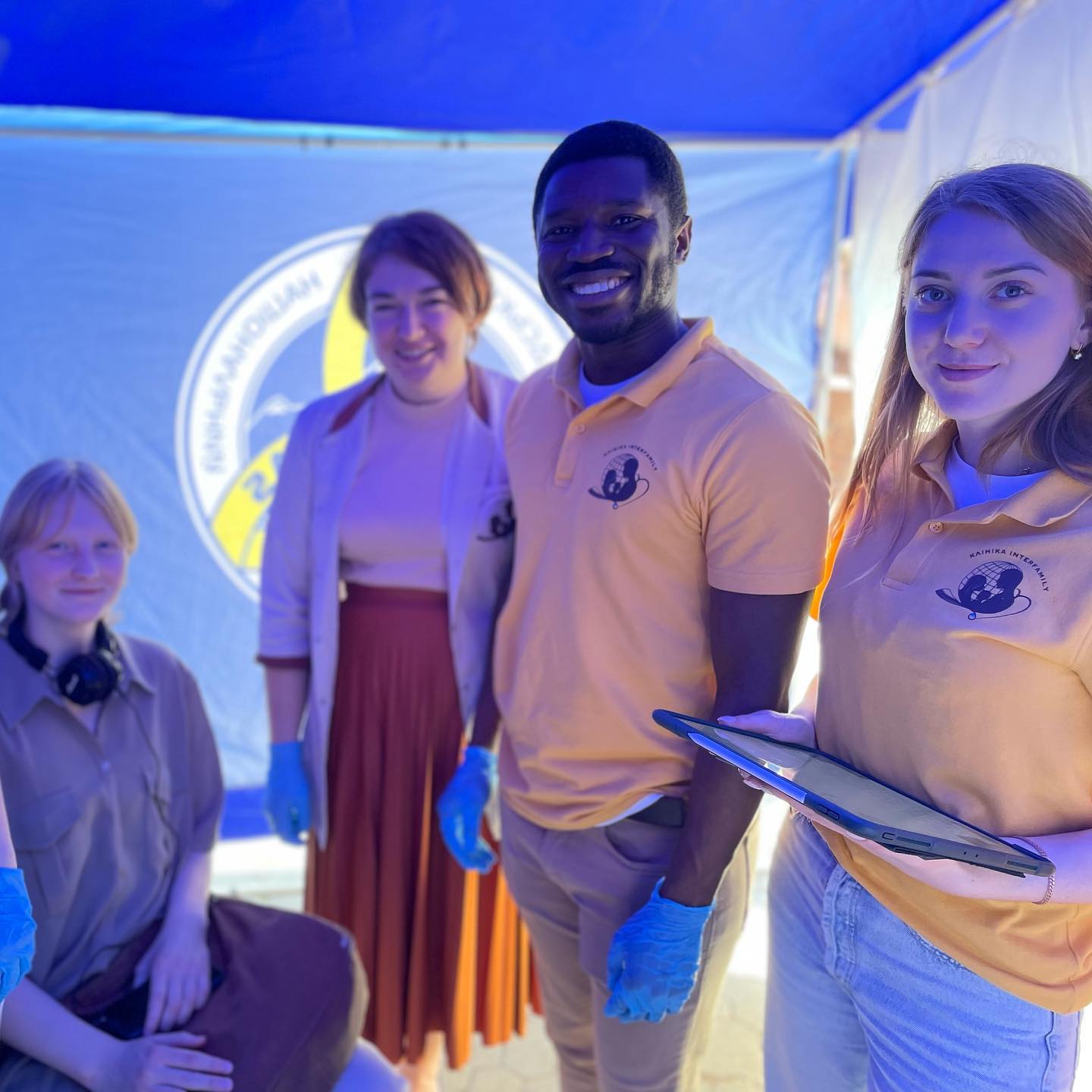
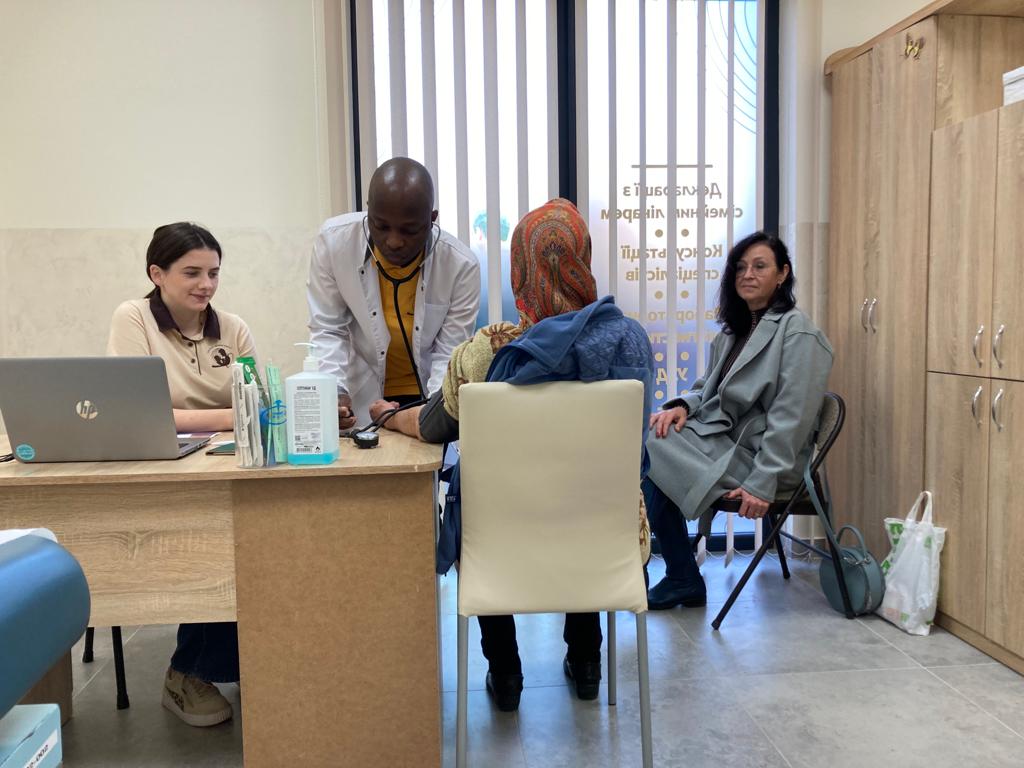
“It brought me to tears. He still works with us. Oh, and by the way, “It was he who came up with our logo for the clinic, and now it is essentially our business card,” Pavlo Olehovych opens his laptop again and shows the written projects, looking for sorted photos, and in one of the files I see a phrase that catches my eye: “With the opening of the new international family medicine clinic, which will also serve as a practical medical training center, we can hope that we are taking a step towards a victorious peaceful future right now.”
“Today we have the official status of a medical institution, we can declare patients and provide free first aid. And we are on the way to two things. The first one (if everything goes well) is that next year, if we are nominated by the health department as an internship base, we will have the official right to take interns for internships, because currently they go to only a few institutions in the region. And the second is obtaining the necessary documents from the NHSU for the second level, that is, for narrow specialists . At present, they come to us whenever they need to, consult, and have certain hours. If we succeed, we will have a chance for additional funding from the NHSU, and then these specialists will be able to provide a certain package of services for the patient free of charge. That’s how it is now.”
The clinic’s specialists, volunteer doctors, can often be found at volunteer stations and events. They cooperate with others, including relocated organizations, because they have a spark of caring in their hearts. They form a community of equally ambitious people around them who believe in a better, victorious Ukrainian future. And it is very inspiring!
Reference. The material was prepared and published within the framework of the project “Active Community: The Right to Choose”, which is supported by the National Democratic Institute (NDI) with funding provided by the United States Agency for International Development.
Note. The mission of Active Community is to achieve prosperity through the democratic development of Ukrainian communities. Target for 2025: to activate and engage at least 1% of citizens in decision-making and promoting reforms in Ukraine on a systematic basis for the well-being of Ukrainian communities. The initiative was created as part of the activities of the Respublica Institute. We work to increase the conscious activity of citizens.
Source: https://ag.com.ua/success-stories/na-varti-zdorovya-yak-medichne-volonterstvoperetvoryuetsya-u-spravu-zhittya_2035/?fbclid=IwAR2Hw9XJ8iNNrPd1Zl6Fp0GAMTIjq5Ay07vl0qQv2UHkYaNANwqDIF6HbIM